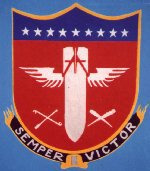|
As
the B-29's hammered Japanese cities to rubble, in the closing
months of the war, Japanese aircraft designers with an inventiveness
fueled by desperation designed an array of fascinating,
fearsome and potentially deadly new aircraft. These new
aircraft, was an attempt to counter, to some degree the
Allies' immense superiority in numbers of aircraft.
One
of the aircraft was the Yokosuka MXY7 Ohka, or Cherry Blossom,
which we called Baka, or Fool as the pilot directed aircraft
was designed to dive into enemy aircraft or ships. This
writer and crew were stalked by a Betty carrying an Ohka
one night. The aircraft itself was made of wood, with a
type 4 MK 1 model 20 rockets with a thrust of 1,764 pounds.
It had a wingspan of about 16 feet and length of almost
20 feet. The standard model had twin fins and rudder. Maximum
speed was 403 mph with a terminal dive velocity of 575 mph.
It weighed 4,718 pounds as slung under a Betty Bomber. It
carried a 2,646-pound war head in the nose.
The
Mitsubishi J8M1 or Shusui was almost a direct copy of the
Me-163. It was designed to climb to over 32,000 feet in
a little more than three minutes. It carried two 30mm cannons
in its wings. It had an endurance of about seven and one
half minutes. The Shusui was designed to use an undercarriage
for take off, which was jettisoned, after being airborne.
Landing was accomplished on ski like central skid. On its
first flight the engine failed with the Shusui crashing
and killing the pilot. That was the last of the Shusui effort.
The
Nakajima Kikka was twin-engine jet designed to reach a speed
of about 433 mph. It was meant to carry a 1,100 bomb. This
was the only jet powered Japanese aircraft to take of under
its own power during WWII. It crashed on it second attempt.
The
Kyushu J7W Shiden was a rear engine interceptor fighter
that was flight tested just 12 days before the war ended.
It was the only pusher type of aircraft that was slated
for mass production for any nation during WWII. Aft of the
cockpit, which was just ahead of the wing, was a 2,130 hp
radial engine that drove the rear propeller with an extension
shaft. It had design speed of 466 mph which was about 30
mph faster that the P-51 Mustang. The long nose housed four
cannon. It was the only aircraft of WWII of the canard type,
that is, the elevators were positioned at the front end
of the nose of the aircraft.
Dr.
Vic Durrance, Historian
39th Bomb Group
|



